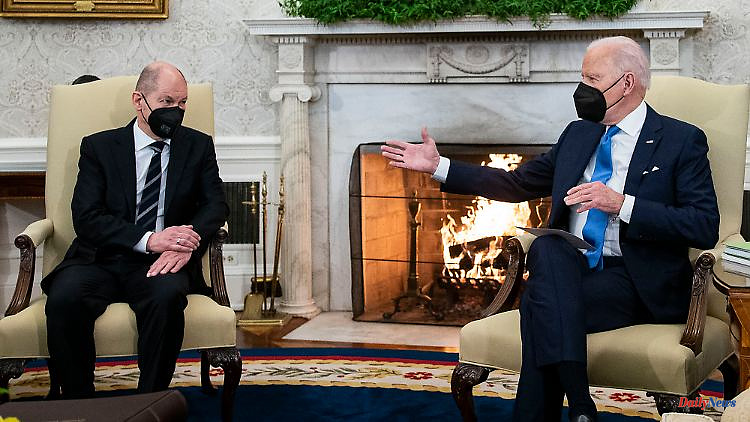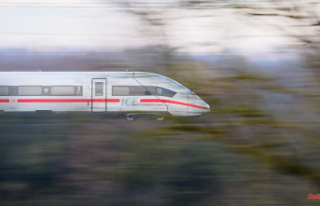Chancellor Scholz will speak to US President Biden in Washington this Friday. Unlike usual, he is not taking journalists to the United States, and a press conference is not scheduled. That leaves room for speculation. Which question are they trying to avoid?
When chancellors fly to the United States, they usually don't travel alone, but with a baggage train - a press baggage train. For example, around 25 media representatives came along when Olaf Scholz recently visited India. Not that many journalists are always there, but Scholz usually has one or two dozen in his wake.
Not so this Thursday, when he leaves for the United States for the second time in his tenure as Chancellor - he flies completely without any press. The federal government justified this by saying that it was only "a short working visit". But that doesn't mean that the visit is unimportant, as government spokesman Steffen Hebestreit clarifies at the same time: "The focus of this visit is an extensive discussion between the US President and the German Chancellor," he says. The two had "agreed for a long time that they would like to exchange information 'one on one', even without talking to each other via telephone line, video connection or something like that, but very confidentially". That is the only reason for this trip. problems? There is not any.
In the political and media public, the decision not to invite the press caused irritation. CDU leader Friedrich Merz asked the chancellor on Thursday in the Bundestag why he had not explained the purpose of the trip. The opposition leader did not receive an answer.
Are German-American relations so bad that Scholz would not be able to keep up appearances in front of an audience? The head of the German Marshall Fund's Berlin office, Sudha David-Wilp, doesn't think so: "I think the German-American partnership is strong and adapting to the new geopolitical realities." The US government was "very happy about the German decision to turn the tide", but also knows "that things take time".
Scholz takes little time to Washington, his stay there should not last longer than two hours. There is a picture session in the Oval Office, during which the US President and his guest will sit in the yellow armchairs that Angela Merkel and Donald Trump have already sat on - even during the visit when Trump did not hear that the Chancellor told him suggested shaking hands.
As in the past, the journalists accredited to the White House will take the opportunity this time to call out questions to the two politicians. Unlike formal press conferences, the setting there is so chaotic that it's easy to ignore topics or smile away.
There is one topic in particular that could be considered: the conflict over the delivery of battle tanks to Ukraine. The federal government consistently denies that such a dispute ever existed, but it cannot resolve a central contradiction. "At no time was there, as it was said, a juncture or a demand that one thing had to happen so that the other could happen," Hebestreit said on January 20 about the delivery of German Leopard II tanks and American Abrams said. The White House presents the process very differently: The president originally decided against supplying Ukraine with Abrams tanks "because his military told him that they would not be useful on the battlefield in this fight," said Biden's national security adviser Jake Sullivan recently on ABC News.
"What would be useful would be German tanks," Sullivan further explained the US position. "A tank called Leopard that many different European countries have." But the Germans told Biden that they would not be willing to send those Leopard tanks into battle "unless the President agreed to send Abrams as well." Biden then agreed, "in the interests of alliance unity and to ensure Ukraine gets what it wants."
In short: According to the White House, there was indeed a Junktim. And only one version can be correct, Sullivan's or Hebestreit's.
Scholz and Biden are likely to studiously ignore questions about this issue. You will get away with it too: During the Scholz visit there is not only no press support, but also no joint press conference. This is usually also provided: There are two questioners per page, each of whom can ask two questions, makes eight questions, thank you, goodbye. During Scholz's first visit as chancellor to Washington in February 2022, it lasted almost half an hour. Hard to imagine that this time the schedule was too tight.
"It is strange that there is no press conference during this visit," says Sudha David-Wilp. "Probably there are reasons, but of course that leaves room for speculation - and I suppose that's exactly what they wanted to avoid."
On the other hand: Both Scholz and Biden have long since answered all questions that could arise about the Abrams-Leopard dispute. "I'm sure Washington didn't see the point in sending Abrams tanks to Ukraine," says David-Wilp. "But for the sake of transatlantic unity, and because he saw that this was important to Chancellor Scholz, he agreed, thus enabling the delivery of Leopard tanks."
When asked in January, after the announcement of the tank decision, whether Germany had forced him to change his mind about the Abrams tanks, Biden laughed and said Germany hadn't forced him. "We wanted to make sure we're all together." At the same appearance, he called Scholz a "strong, strong voice for unity" in the western alliance and a "close friend".
Just a few days before this appearance, the "Süddeutsche Zeitung" reported that the United States was "angry at Scholz" because at that time Scholz had still not promised to supply Leopard tanks. A meeting between US Secretary of Defense Lloyd Austin and Chancellor Wolfgang Schmidt in the Berlin Chancellery is said to have been "tense" and the two "got into a war of words".
The report was denied by the federal government at the time. Previous decisions should not play any role for the upcoming meeting anyway, says Hebestreit. Rather, it is "about the 'way ahead': How will the next few months be in Ukraine? What does that mean for the support that the Allies, the allies for Ukraine, can organise?" It should also be about China, as White House spokeswoman Karine Jean-Pierre said in mid-February.
Another issue is likely to be the subsidy program that the USA launched with the Inflation Reduction Act and which the Europeans view critically. However, these are not topics to which Scholz and Biden have no answers, even if they are evasive. An interview may shed light on this. As in February 2022, Scholz answered questions from a US broadcaster on Friday. It is inconceivable that the chancellor could believe that he would not have to hear any uncomfortable questions there.
Because there was one point of contention back then, which was not about tanks, but about a pipeline: CNN presenter Jake Tapper wanted to know from Scholz what would happen to Nord Stream 2 if Russia attacked Ukraine. Despite repeated inquiries, Scholz did not commit himself, only said sentences like this: "All the steps that we will take, we will take together", there will be no differences between Germany and the USA. Pretty much exactly that should be his message this time too.












